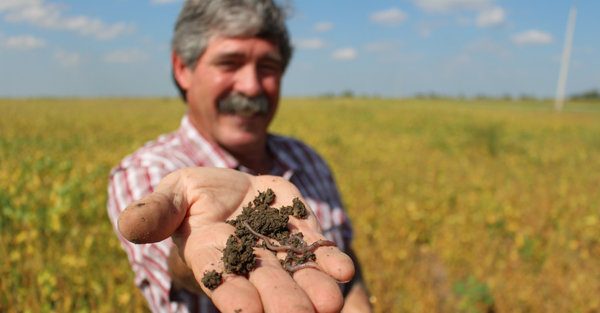
Farmer-Scientist Focused on Soil Health
Rob Stout has been described a number of ways. Master farmer. Award-winning conservationist. Community volunteer. Good neighbor. Farmer-scientist.
Evidence of these roles can be found in the fields surrounding his home near Washington, Iowa.
Orange flags dot the landscape marking data collection points for Iowa State University research. At any given point Stout has numerous collaborative research projects underway, “I’ve never stopped to count them,” he says.
A recent conversation revealed at least six ongoing studies. “I just love that stuff. I geek out when it comes to research,” Stout says. “Working with Iowa State gives me the best of both worlds (farming and research). I can’t wait to get the results and think of ways to implement them into our farm.”
The flags in fields closest to his home mark the location of buried tea bags. The decomposition of the tea bags will help Iowa State researchers better understand factors affecting soil health—a topic close to his heart (read more about the research).
Stout (’78 farm operations) worked as an undergraduate research assistant for Walter Fehr (’67 PhD agronomy), Charles F. Curtiss Distinguished Professor in Agriculture, and was advised by Maynard Hogberg (’66 ag and life sciences education, ’72 MS animal science, ’76 PhD) during his time at Iowa State. Both professors tried to recruit him to pursue graduate school in their programs.
But, opportunity knocked when a neighbor of the Stout family invited him to meet around their kitchen table during his senior year at Iowa State. The neighbor had a few hundred acres of tillable ground available for rent. Stout’s course was set.
His drive to learn and discover deepened throughout his farming career. So did his kitchen-table collaborations.
He gathered friends and neighbors together to create the West Fork Crooked Creek Watershed Improvement Project. Joining them at the table was Jamie Benning (’01 agronomy, MS ’03 soil science) water quality program manager for Iowa State University Extension and Outreach.
“There are several characteristics we look for when identifying farmers to lead water quality efforts including experience in agricultural, conservation and community organizations. Another characteristic is their drive to collect data and evaluate new practices. Rob is a great example of this type of scientist-farmer,” Benning says. “He is a great collaborator in on-farm research and demonstration projects.”
Due in part to their leadership efforts, West Fork Crooked Creek Watershed and two neighboring watersheds received funding from the Iowa Department of Agriculture and Land Stewardship Water Quality Initiative to support conservation and water quality practice implementation.
The watershed was able to install two bioreactors and cover crop adoption has grown to over 15 percent of corn and soybean acres compared to the statewide average of 2-3 percent.
“It’s our duty as farmers to be good stewards of the land and leave our water quality better than we found it,” Stout says. “Everything we do impacts our watershed. I’m surrounded by a lot of good farmers and neighbors who also care about their ground and how we leave it for future generations.”
Stout has been farming for 35 years, and his farm has been in their family since 1926. Stout farms 1,100 acres and manages a hog operation of 9,000 head. His stepson, Alex, works with him handling facility management and partners in conservation efforts to encourage wildlife and plant diversity.
No-till, terraces, grass waterways, prairie strips—the list of conservation practices on the Stout farm runs the full gamut. They inject manure from their hog operation into the fields to target nutrients and reduce run-off. And, he’s seen a dramatic decrease in the amount of nitrates leaving his farm thanks to the bioreactor installed in 2014.
“The bioreactor has lowered nitrate levels in the tile water by nearly 70 percent over three years, and other practices have reduced nitrates by 30-45 percent,” Stout says. “I’ve noticed a decrease in nitrogen exiting the bioreactor as high as 99 percent in late summer and early fall. The average during spring rain events ranges from 40-60 percent reduction in nitrogen.”
Stout has been an active participant in Iowa Learning Farms and Practical Farmers of Iowa cover crop projects. He started by planting 10 acres of cover crops in 2009 and is now managing all 1,100 acres using cover crops. Since adopting cover crops he’s noticed improved soil health and a small yield bump, around five percent in soybean yields.
“I could tell the cover crops were helping to prevent erosion and build soil organic matter almost immediately. I can pull up a spade full of soil anywhere in the field and find earthworms. That’s a good sign of soil health,” he says.
The Stout family’s commitment to conservation is clear and award-winning. Their family was one of the first to receive the Iowa Farm Environmental Leader Award from Gov. Terry Branstad at the 2012 Iowa State Fair. Stout has been named the Iowa Soybean Association Environmental Leader of 2016 and the 2017 Gary Wergin Good Farm Neighbor Award Winner.
Stout loves to share his enthusiasm and experience with other farmers. His ability to connect and lead earned Stout leadership positions in the Iowa Farm Bureau, Iowa Corn Growers Association, Iowa Soybean Association, Iowa Pork Producers Association and as a trustee for his church. He’s also a member of the Timely Tips panel of experts in Wallaces Farmer and hosts field days and members of the media throughout the year.
“Meetings. I go to a lot of meetings,” Stout jokes. His wife Jean agrees. “But he loves it,” she adds with a smile.
##
Learn more about Rob Stout and his commitment to conservation online in this video by the Coalition to Support Iowa Farmers and Iowa Learning Farm’s Conservation Chat.



